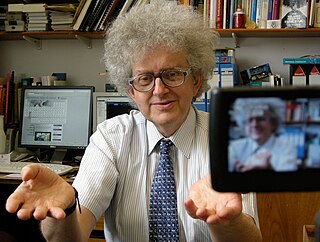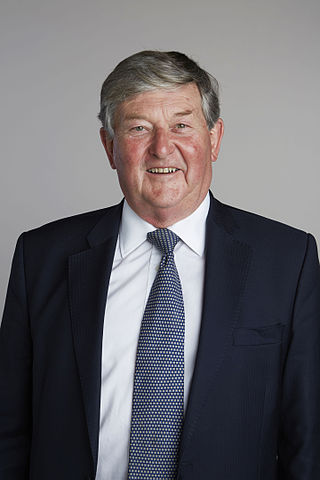
Protactinium is a chemical element; it has symbol Pa and atomic number 91. It is a dense, radioactive, silvery-gray actinide metal which readily reacts with oxygen, water vapor, and inorganic acids. It forms various chemical compounds, in which protactinium is usually present in the oxidation state +5, but it can also assume +4 and even +3 or +2 states. Concentrations of protactinium in the Earth's crust are typically a few parts per trillion, but may reach up to a few parts per million in some uraninite ore deposits. Because of its scarcity, high radioactivity, and high toxicity, there are currently no uses for protactinium outside scientific research, and for this purpose, protactinium is mostly extracted from spent nuclear fuel.
A period 1 element is one of the chemical elements in the first row of the periodic table of the chemical elements. The periodic table is laid out in rows to illustrate periodic (recurring) trends in the chemical behaviour of the elements as their atomic number increases: a new row is begun when chemical behaviour begins to repeat, meaning that analog elements fall into the same vertical columns. The first period contains fewer elements than any other row in the table, with only two: hydrogen and helium. This situation can be explained by modern theories of atomic structure. In a quantum mechanical description of atomic structure, this period corresponds to the filling of the 1s orbital. Period 1 elements obey the duet rule in that they need two electrons to complete their valence shell.

The Bhabha Atomic Research Centre (BARC) is India's premier nuclear research facility, headquartered in Trombay, Mumbai, Maharashtra, India. It was founded by Homi Jehangir Bhabha as the Atomic Energy Establishment, Trombay (AEET) in January 1954 as a multidisciplinary research program essential for India's nuclear program. It operates under the Department of Atomic Energy (DAE), which is directly overseen by the Prime Minister of India.

Andrew Zbigniew Szydlo is a British chemist and chemistry teacher, best known for his talks and lectures on chemistry.

Malcolm Leslie Hodder Green was Professor of Inorganic Chemistry at the University of Oxford. He made many contributions to organometallic chemistry.
Kevin Jeremy San Yoong Fong is a British doctor and broadcaster. He is a consultant anaesthetist and anaesthetic lead for Major Incident Planning at UCL Hospitals. He is a professor at University College London where he organises and runs an undergraduate course Extreme Environment Physiology. Fong also serves as a prehospital doctor with Air Ambulance Kent Surrey Sussex and specialises in space medicine in the UK and is the co-director of the Centre for Aviation Space and Extreme Environment Medicine, University College London.

Sir Martyn Poliakoff is a British chemist, working on fundamental chemistry, and on developing environmentally acceptable processes and materials. The core themes of his work are supercritical fluids, infrared spectroscopy and lasers. He is a research professor in chemistry at the University of Nottingham. As well as carrying out research at the University of Nottingham, he is a lecturer, teaching a number of modules including green chemistry.

Justin Rowlatt is a British journalist, news reporter and television presenter who is currently working as Climate Editor for BBC News. In February 2015 he became the BBC's South Asia Correspondent, based in Delhi. In June 2019 he became the BBC's Chief Environment correspondent.

Baron Jöns Jacob Berzelius (Swedish:[jœnsˈjɑ̌ːkɔbbæˈʂěːlɪɵs] was a Swedish chemist. Berzelius is considered, along with Robert Boyle, John Dalton, and Antoine Lavoisier, to be one of the founders of modern chemistry. Berzelius became a member of the Royal Swedish Academy of Sciences in 1808 and served from 1818 as its principal functionary. He is known in Sweden as the "Father of Swedish Chemistry". During his lifetime he did not customarily use his first given name, and was universally known simply as Jacob Berzelius.
The UCL Faculty of Engineering Sciences is one of the 11 constituent faculties of University College London (UCL). The Faculty, the UCL Faculty of Mathematical and Physical Sciences and the UCL Faculty of the Built Envirornment together form the UCL School of the Built Environment, Engineering and Mathematical and Physical Sciences.
The UCL Faculty of Mathematical and Physical Sciences is one of the 11 constituent faculties of University College London (UCL). The Faculty, the UCL Faculty of Engineering Sciences and the UCL Faculty of the Built Envirornment together form the UCL School of the Built Environment, Engineering and Mathematical and Physical Sciences.

Anthony John Ryan is an English polymer chemist and sustainability leader at the University of Sheffield. He was Pro-Vice-Chancellor of the university's Faculty of Science from 2008 until 2016, and is currently Director of the Grantham Centre for Sustainable Futures. He delivered the 2002 Royal Institution Christmas Lectures and has appeared on programmes including the BBC Radio 4 comedy and popular science series The Infinite Monkey Cage. He has collaborated on a range of arts and sciences projects with Professor Helen Storey from the London College of Fashion, University of the Arts London.

David Phillips, is a British chemist specialising in photochemistry and lasers, and was president of the Royal Society of Chemistry from 2010 to 2012.
John Derek Woollins is a chemist who was Provost of Khalifa University, Abu Dhabi having previously been Vice Principal, Provost of St Leonard's College, at the University of St Andrews. Woollins' reagent is named after him.

Saiful Islam is a British chemist and professor of materials modelling at the Department of Materials, University of Oxford. Saiful is a Fellow of the Royal Society of Chemistry (FRSC), and received the Royal Society's Wolfson Research Merit Award and the Hughes Medal, and the American Chemical Society Award for Energy Chemistry for his major contributions to the fundamental atomistic understanding of new materials for lithium batteries and perovskite solar cells.

Thomas Welton is a professor of sustainable chemistry at Imperial College London. He served as head of the department of chemistry from 2007 to 2014 and as dean of the faculty of natural sciences from 2015 to 2019. He is a Fellow and the current president of the Royal Society of Chemistry. Welton's research focuses on sustainable chemistry, with particular focus on ionic liquids and on solvent effects on chemical reactions. Welton is openly gay and is active in advocating for greater visibility for members of the LGBT community in the sciences. He is a member of the UKRI Equality, Diversity and Inclusion External Advisory Group.

Hannah Fry is a British mathematician, author, and radio and television presenter. She is Professor in the Mathematics of Cities at the UCL Centre for Advanced Spatial Analysis. Her work has included studies the patterns of human behaviour, such as interpersonal relationships and dating, and how mathematics can apply to them. Fry delivered the 2019 Royal Institution Christmas Lectures, and has presented several programmes for the BBC, including The Secret Genius Of Modern Life.

Ijeoma Uchegbu is a Nigerian-British Professor of Pharmacy at University College London where she held the position of Pro-Vice Provost for Africa and the Middle East. She is the Chief Scientific Officer of Nanomerics, a pharmaceutical nanotechnology company specialising in drug delivery solutions for poorly water-soluble drugs, nucleic acids and peptides. She is also a Governor of the Wellcome, a large biomedical research charity. Apart from her highly cited scientific research in Pharmaceutical Nanoscience, Uchegbu is also known for her work in science public engagement and equality and diversity in Science, Technology, Engineering and Mathematics (STEM). In December 2023, it was announced that she will become President of Wolfson College, Cambridge in October 2024.

Paul Francis McMillan was a British chemist who held the Sir William Ramsay Chair of Chemistry at University College London. His research considered the study of matter under extreme conditions of temperature and pressure, with a focus on phase transitions, amorphisation, and the study of glassy states. He has also investigated the survival of bacteria and larger organisms (tardigrades) under extreme compression, studies of amyloid fibrils, the synthesis and characterisation of carbonitride nanocrystals and the study of water motion in confined environments. He has made extensive use of Raman spectroscopy together with X-ray diffraction and neutron scattering techniques.














